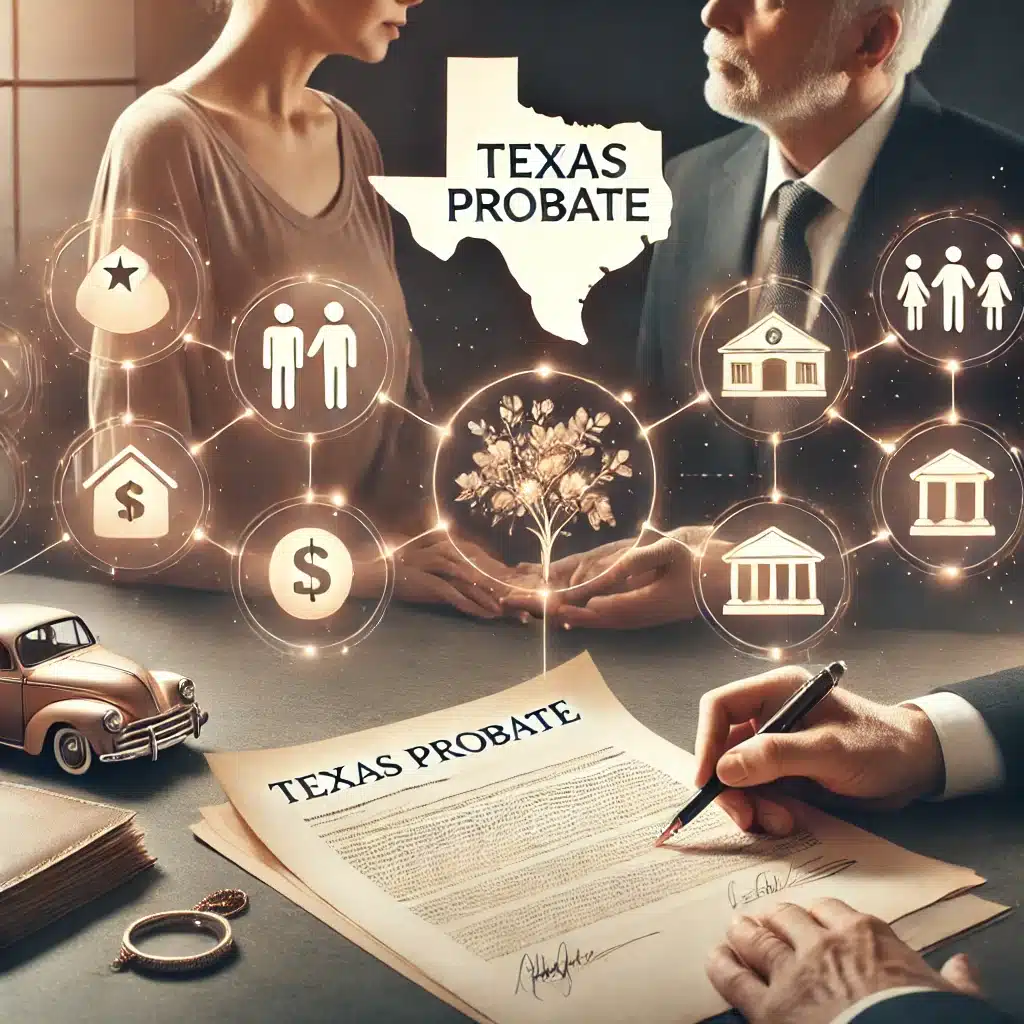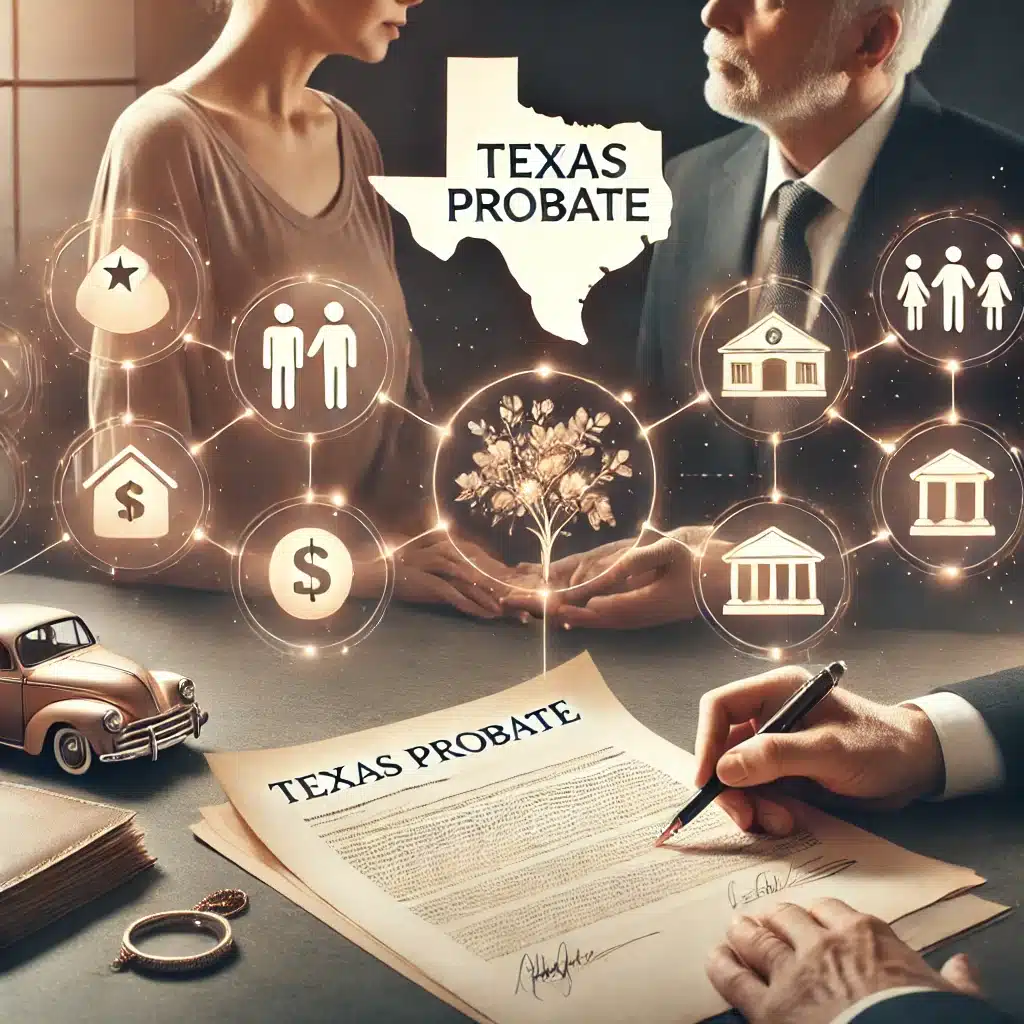As Texans, we hold a powerful right often taken for granted—the ability to decide what happens to our assets through Texas probate property laws after death. Unlike many countries where the state dictates asset distribution, Texas law empowers individuals to shape their estate’s future. With proper planning, you can ensure your property passes to chosen beneficiaries, typically loved ones, rather than leaving it up to the courts. Without a will or estate plan, Texas probate property may be distributed according to default rules, potentially placing your assets in the hands of the government or individuals you never intended to benefit.

Why having a will is essential for protecting your property and wishes
I highly recommend that everyone over 18 have a will. It protects your wishes and prevents your property from going to someone you don’t want. Without a will, the law ignores your desires, and your property may end up with the government. Make your wishes known to ensure your rights over your assets. At that stage, the laws of intestate distribution would come into play, and a probate court judge would determine where your property would end up upon your passing.
Just because most Americans and Texans die without a will does not mean that you should be one of those people. Not giving those people most important to you the right to receive your property upon your passing is a huge mistake. By the same token, you also cannot specify which people you do not want to inherit from me. This does not mean that you are petty or greedy if you have people in mind whom you do not want to inherit from you.
For instance, you may know of certain people in your life whose inheriting property would be a major negative for them. This could be for any number of reasons, but mostly because those persons would abuse the privilege of inheriting property. As such, you should think carefully about what you want your legacy to be and whether or not you want to risk passing away without a will. I hope you can already tell that the effects of your doing so can be significant and negative.
Why is it that most people die without a will?
When I made that statement earlier, that most people in our country and state die without a will, that may have caught some of you by surprise. To understand why this is a problem, we also need to discuss why it is that people die without a will. Passing away without a will prevents you from exercising your rights to decide how your property will be distributed after your death. This situation places you at a significant disadvantage and is an entirely avoidable mistake. It’s not as if there is someone or something out there that is actively preventing you from drafting a wheel. Rather, no one out there is trying to prevent you from drafting your will. It is only what I’m doing that prevents you from getting well drafted.
Why everyone needs a will, regardless of property ownership
One of the major reasons why I observed people not having a will is that they do not own much property. You may think that because you don’t own much property, it is not important for you to have a will. However, I can tell you that there are specific reasons why every person reading this blog post needs to have a will, regardless of how much property they own.
For one, if you have a will in place, you can put into practice certain provisions on who should take care of your children upon your passing. This is a much more advantageous position to be in than to have to punt that decision to a court after your passing. Bear in mind that a court may choose a person that you would not have approved of to control your child’s finances and life in general.
Another factor to bear in mind when it comes to creating a will is that your estate may grow to some extent between the time of your drafting a will and passing away. For example, you may draft a will now while you are still in school or are just beginning out in your career. Your income may steadily increase during that time, and therefore, you may stand to have a much larger estate by the time your will goes into effect. Additionally, you may simply inherit a great deal of money or even win money in a contest or lottery.
The risks of passing away without a will
Finally, you have to consider the unfortunate possibility that you could pass away under circumstances that are less than desirable, such as an auto accident or workplace incident. In that situation, you are a state that may be in a position to capitalize on any available legal actions, such as a wrongful death case. All of these are possibilities that would make the drafting of a will extremely important.
Another reason why you or anyone else, for that matter, may pass away without a will would be if you simply did not understand how important it was to have a will. While I believe most people understand what a will is and its purpose in our day-to-day lives, it could be that you did not know what it will is or even conceive of what purpose the will could serve. In that case, you could foreseeably die without ever having known what a wheel is.
Related to this circumstance is one that involves you having some wrong ideas about what penalties may attach to the inherited property for your loved ones by having a will. This is significant, and there may not be much of an opportunity to clear up any misconceptions before your passing. Whether it is through the creation of a trust or will, there are many benefits to proper estate planning. However, even the best estate plan cannot overcome a lack of knowledge or inability to think through the issues associated with their case.

Consider the consequences of not having a will
Unfortunately, you will also find people who simply do not care what happens to their property once they are gone. The surprising thing is that some of these people will even be quite wealthy and have spent a fair amount of time accumulating wealth and undergoing proper state planning, saving, and other efforts during their lives. However, these people will shrug off any consequences of not having a will by telling you that it is not important what happens to their property after their passing. Meanwhile, their families may struggle because they lack a will, making it difficult to access the property accumulated during their lives. If this sounds like you, I think it would be sensible to consider what effect you’re not having a will could have on your family.
The cost of having a will drafted is something that I have heard many people complain about in the past. Ironically, these same people will oftentimes shrug off the potential impacts of their passing away without a will. The way I see it, investing in an attorney on a short-term basis to draft a will is about the smartest decision you can make.
The reason is that all of your hard work throughout your life to accumulate property could go for a loss if you cannot properly plan for your passing. Bearing in mind that none of us knows the exact moment we’re going to pass away, it is an extreme risk to either delay drafting a will or not have one at all. This is especially true if her major concern is regarding cost. My argument would be that the cost is too high for you not to have a will.
Understanding the process of drafting a will
Finally, I want to share with you the reality of drafting a will, which involves the amount of time that it takes to prepare for the drafting and get the document onto paper. Without a doubt, to do this right does take some time. It involves meeting with an estate planning attorney and working with that lawyer to plan for your passing as best as possible. You can gather the information that you will need to draft the will, only to find that your lawyer brings up multiple circumstances that you had not even begun to consider. This can be frustrating, especially when you encounter a problem that is serious but you have not considered much previously.
Your attorney may ask you to gather additional information after discussing new insights. When you return with this information, expect a second meeting where your attorney presents a rough draft of your will. The longer the drafting process takes, the more likely you are to run out of funds or motivation to complete it. This time and effort can make many people hesitate to start drafting a will.
One other issue that I think is relevant to discuss is that talking about your death, your life, and your mortality, in general, is a lot to think about. Most of us are not all that comfortable with our mortality, and as a result, the drafting of oil of a will is a particularly unpleasant experience. With that said, not wanting to think about your mortality is no excuse to not have a well-drafted will. Part of being an adult is considering what it means to live, grow wealth, and eventually die. You are doing yourself a disservice by not having a will.
What are some basic ways that property is distributed without a will?
Property not handled through the probate process will be divided and distributed according to Texas laws of intestate succession. Note that these laws may come into play regardless of whether or not you have a will. For example, you may have a will, but it may not be valid. In this case, the laws of intestate succession would come into play despite there being a will. If you were to pass away without a will, and we’re not married, but you did have children or grandchildren, then all of your intestate property would pass to these children or grandchildren.
On the other hand, if you were to pass away unmarried and without children, but you had parents who survived you, then each parent would inherit 1/2 of your estate. If you were to pass away as an unmarried person without a will, but did not have descendants or parents, then your entire estate would pass to your siblings and their descendants. If you lack immediate family, the estate will be split into two halves. One half will go to your father’s side of the family, while the other half will go to your mother’s side.
How can you prepare for your passing regardless of how much property you own?
One of the important things you can do in life is to have a will. This goes without saying, but it’s still something that many people disregard in terms of their daily lives. No one is arguing that it is not pleasant to have to think about our mortality and our death in terms of what will happen to our family and our property at the time of our passing. Regardless of whether or not you have a will, it is not likely to be a subject that you want to think about very much, if at all. The same goes for our families. While some topics may come up frequently among families, this might not be one of them.
The importance of having a will for effective estate planning
Given this, you must speak with an experienced probate estate planning attorney to determine which property to include in your will. Certain assets do not require inclusion in this process, regardless of whether you have a will. Instead of detailing the property likely to be part of your probate case, it’s more straightforward to list the assets that won’t be included.

However, we have already discussed how and why it is important for you to have a will. Not only are you leaving it up to another person to determine where your property will end up after your passing, if you do not have a will, the reality is that you are not caring for your family as best as you can by passing away without a will. You can leave a strong legacy for evil proper for the state planning period however, you have to choose to engage in the process for this to be the case.
The benefits of life insurance and retirement accounts
Life insurance benefits do not have to go through probate. In a life insurance policy, you name a beneficiary who can claim the proceeds by submitting a death certificate directly to the insurance company. You don’t need to involve the probate court. Once the company receives the certificate, it processes the claim and releases the funds. This simple step allows the beneficiary to access the life insurance proceeds without any court involvement.
Finally, retirement benefits through an IRA or 401K do not have to go through probate. In much the same way as life insurance policies, you would name a beneficiary, and the proceeds from the account will go directly to the beneficiary after your passing. This way, your family would not have to submit the account to the probate process.
Conclusion
Understanding how to manage Texas probate property is a vital part of responsible estate planning. By taking advantage of Texas probate laws, individuals can clearly define who should receive their assets, ensuring their wishes are honored after death. Proactive planning—whether through wills, trusts, or other legal tools—helps prevent confusion, disputes, and the risk of property ending up with unintended recipients. Properly designating beneficiaries not only protects family legacies but also brings peace of mind. Navigating the Texas probate property process with clarity and legal support ensures your estate transitions smoothly and preserves your intent for generations to come.
Questions about the material contained in today’s blog post? Contact the Law Office of Bryan Fagan
If you have any questions about the material contained in today’s blog post, please do not hesitate to contact the Law Office of Bryan Fagan. Our licensed estate planning and probate attorneys offer free of charge consultations six days a week in person, over the phone, and via video. These consultations are a great way for you to learn more about the world of estate planning law as well as to learn more about how your family circumstances may be impacted by either an estate planning or probate case.
Ebook
![Adobe Stock 62844981[2]](https://bryanfagan.com/wp-content/uploads/2023/09/AdobeStock_628449812.jpeg) If you want to know more about what you can do, CLICK the button below to get your FREE E-book: “16 Steps to Help You Plan & Prepare for Your Texas Divorce”
If you want to know more about what you can do, CLICK the button below to get your FREE E-book: “16 Steps to Help You Plan & Prepare for Your Texas Divorce”
![Divorce Wasting Assets[4]](https://bryanfagan.com/wp-content/uploads/2023/09/Divorce-wasting-assets4.jpeg) If you want to know more about how to prepare, CLICK the button below to get your FREE E-book: “13 Dirty Tricks to Watch Out For in Your Texas Divorce, and How to Counter Them” Today!”
If you want to know more about how to prepare, CLICK the button below to get your FREE E-book: “13 Dirty Tricks to Watch Out For in Your Texas Divorce, and How to Counter Them” Today!”
Other Articles you may be interested in
- Where Was Texas Probate Code 5b Transferred To: A Complete Analysis
- Understanding Mobile Homes in Texas Probate: Key Considerations
- How to File a Pleading in Texas Probate: A Step-by-Step Guide
- Grounds for Divorce in Texas
- Filing for Divorce in Texas
- Texas Contested Divorce
- Alternative Dispute Resolution in Texas
- High Net Worth Divorce in Texas
- Texas Out-Of-State, International Divorce & Military Divorce
- Why do divorces cost so much in Texas?
- Reduce stress and costs in a divorce by mediating your case
- How to budget for a cost-friendly divorce in Texas
- What assets must go through probate in Texas?
- Is a codicil legally binding?



